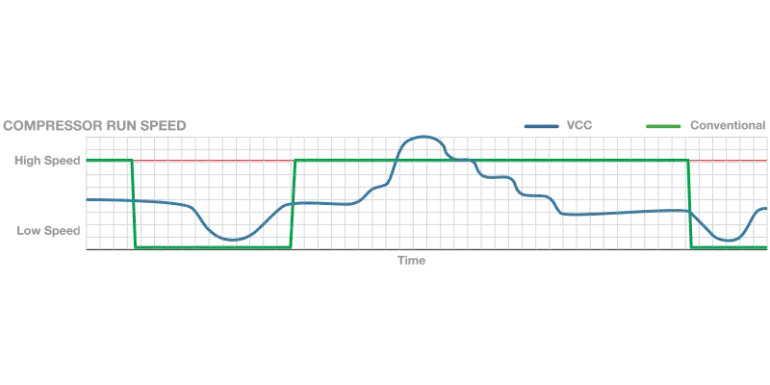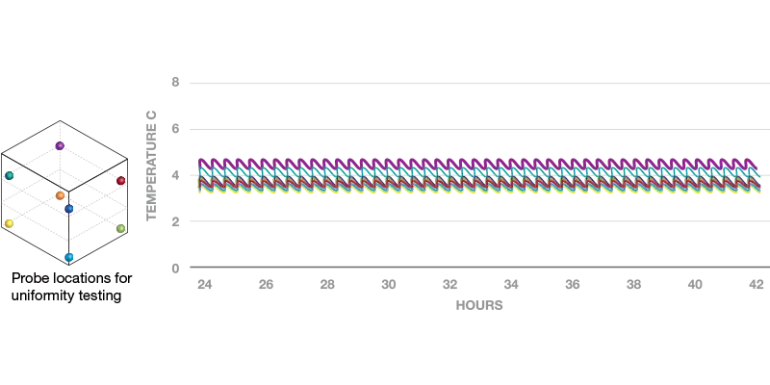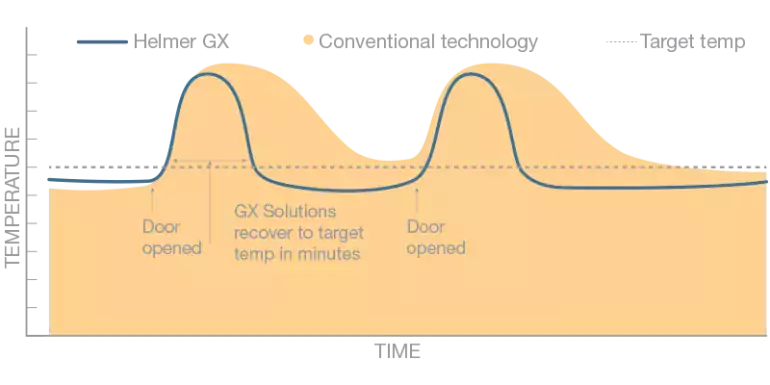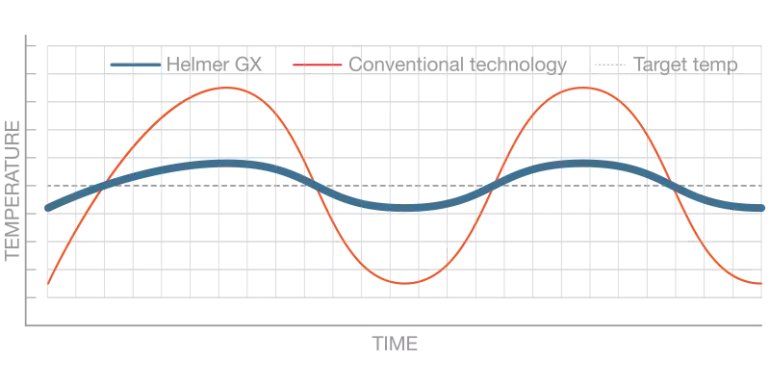Medical-grade cold storage is a critical equipment category for clinical applications. Ensuring temperature-sensitive blood therapies, clinical samples, reagents/controls, medications and vaccines are appropriately safeguarded is necessary to maintain patient safety, support regulatory compliance, and prevent economic loss.
New cooling technology advances the performance of medical-grade cold storage using Variable Capacity Compressors (VCC), Electronically Commutated Motors (ECM), and natural hydrocarbon refrigerants. This paper describes these technologies and discusses resulting benefits for clinical applications using OptiCool™ technology in the Helmer Scientific’s GX Cold Storage Solutions.
OVERVIEW
Variable Speed Technology
OptiCool™ cooling system technology uses Variable Capacity Compressors (VCC) in place of Fixed Capacity Compressors (FCC). Traditional single-speed FCC compressors operate at maximum speed or shut off completely. This compressor operation method is effective when high-cooling capacity is required for rapid pull-down of temperatures, but it is not optimized for applications that may require low-cooling capacity for periods of time. Variable Capacity Compressors (VCC) are designed to run using a broad range of speeds, and run speed will respond appropriately and efficiently to maintain target temperature.
Used in combination with VCC, new Electronically Commutated Motors (ECM) replace less efficient motors historically used in medical-grade refrigeration. These new ECMs allow the system’s evaporator fan (the fan that circulates air throughout the system) to operate at variable speeds like the VCC. Motor speeds vary according to conditions, in order to ensure the evaporator runs at optimized level to maintain desired cabinet temperature. By running at variable speeds, these ECMs drive much improved system efficiency, and heat generated by the evaporator fan is significantly decreased lowering the demand on the unit’s compressor system.
Figure 1. Variable Capacity vs. Conventional Compressor Run Speed
VCCs run at variable speeds (depending on operating conditions) to maintain temperature rather than simply cycling off and on like fixed capacity compressors in conventional medical-grade refrigerators.
For medical-grade cold storage applications, VCC and evaporator fan speed play an important role in allowing efficient operation, while also ensuring temperature-sensitive products and samples remain stored under appropriate conditions. For example, when doors of a medical-grade refrigerator are opened, or product with heat-load is introduced into the cabinet, it is critical that the cold storage unit recovers temperature quickly. In this case, the VCC and evaporator fan will run at the highest speed possible to rapidly bring temperatures into range. When cold storage is only accessed periodically or is not used for extended periods (perhaps in a clinic that is closed on nights/weekends or a low utilization area of a hospital), the VCC and evaporator fan will run at very low speeds to efficiently maintain temperatures.
Natural Hydrocarbon Refrigerants
OptiCool™ cooling system technology uses natural hydrocarbon refrigerants in place of hydrofluorocarbon refrigerants (HFCs). Natural hydrocarbons are environmentally friendly refrigerants that have very limited impact on Global Warming Potential (GWP) and no impact on Ozone Depletion Potential (ODP). This category of refrigerants is considered environmentally benign, and is also proven to be highly efficient by allowing significantly lower refrigerant charge when compared to HFCs.
Hydrocarbon refrigerants are different from HFCs. Whereas hydrocarbon refrigerants are naturally occurring organic gases, HFCs are chemically manufactured gases that may remain in the atmosphere for up to 30 years after release. Hydrocarbon refrigerants have been developed as a safe, effective, and efficient alternative to HFCs.
In addition to the technical benefits of natural hydrocarbons as compared to traditional refrigerants, global sustainability regulation is driving the refrigeration industry to replace HFCs with natural hydrocarbon refrigerants. The US Environmental Protection Agency Significant New Alternatives Program (EPA SNAP program) was designed to identify and evaluate substitutes for substances that have negative effects on the environment. The EPA SNAP program lists hydrocarbon refrigerants as the replacement for HFCs. Similar regulatory and legislative pressures exist in many of the countries that ratified the Kigali amendment. This includes, but is not limited to, members of the European Union and Canada. OptiCool™ technology supports these global sustainability initiatives through the adoption of natural hydrocarbon refrigerants that are designed to address global warming and ozone depletion issues.
IMPROVEMENTS FOR CLINICAL APPLICATIONS
Improvements in refrigeration technology lead to direct benefits for healthcare workers, end-users of equipment, and patients. By leveraging VCC, ECM, and natural hydrocarbon refrigerants, OptiCool™ technology leads to the following performance enhancements:
Temperature Performance
Medical-grade cold storage performance is defined as temperature uniformity, stability and recovery.
Temperature uniformity is the measurement of temperature consistency across all usable locations in the cabinet. Tight uniformity provides confidence that contents are maintained at the correct temperature regardless of storage location. Non-medical-grade equipment may have poor uniformity performance and can include hot and cold spots that cause product to go out of temperature range. This can create both safety and regulatory risks. Therefore, many clinical applications, such as vaccine storage and blood storage, require the use of higher quality cold storage. OptiCool™ technology used in the Helmer Scientific GX Solutions leads to temperature uniformity of +/-1 degree C, allowing clinical users to confidently use all storage locations inside the cabinet even for the most temperature sensitive products.
Figure 2. Temperature Uniformity – GX Solutions
Temperature recovery is the measurement of the time required for a cold storage cabinet to return to after the temperature set point after a door opening. Quick temperature recovery is necessary to ensure that door openings do not cause products to go out of tight temperature ranges required for clinical products.
Variable capacity compressors in combination with powerful forced-air design allow for rapid air exchanges after the door is closed. These air exchanges are important for routine door openings. A study conducted by NIST in 2016 determined that in a clinic setting, refrigerators may be accessed by staff over 30 times in a single hour. Temperature recovery performance is also critical when considering extended door openings due to inventory counts or restocking. Evaluations of OptiCool™ cooling technology demonstrated that during 8 second door openings (basic dispensing of product) refrigerator cabinet temperature never went out of allowable storage range. For extended 3-minute door openings (inventory load with significant rise in cabinet temperature) units quickly pulled down to target range in as little as 11 minutes.
Figure 3. Temperature Recovery – GX Solutions
Temperature stability measures how effectively the cold storage unit maintains temperature at setpoint, even during compressor and auto-defrost cycles. Conventional refrigeration technology leads to wider swings of temperature from setpoint, even during steady-state operation. This is a result of fixed capacity compressors routinely cycling on and off to respond, as temperatures drift above and below setpoint. With Variable Capacity Compressors, OptiCool™ technology allows the compressor to run at the precise speed necessary to maintain set temperature, and will significantly decrease the frequency of compressor cycling observed with conventional technology. Stability is maintained at very high levels when Variable Capacity Compressors are properly implemented OptiCool™ cooling technology used in Helmer GX cold storage solutions results in stability with less than 1-degree Celsius variability from setpoint. This helps to ensure that sensitive, expensive, and highly regulated products remain at the proper temperature.
Figure 4. Temperature Stability – GX Solutions
Energy Efficiency
Helmer Scientific refrigerators that leverage OptiCool™ cooling technology are 50%- 60% more energy efficient than conventional medical refrigerators. For example, the HLR105-GX undercounter laboratory refrigerator was evaluated by a third-party testing laboratory using the Energy Star testing protocol. This protocol challenged the refrigerator over a 24-hour period with a series of door openings and steady-state, closed-door operation.
The results of this evaluation demonstrated that the HLR105-GX refrigerator only used 1.2 kWh/day of energy, which represents less than half the energy required by a conventional unit of the same size, tested using the same protocol. Energy consumption data is published on the ENERGY STAR website for High Performance laboratory refrigerators. Cold storage units using the OptiCool™ cooling technology exceed goals for energy consumption as defined by Energy Star. These units are Energy Star Certified.
Figure 5. Comparison of Energy Usage Between Comparable Undercounter Refrigerator Models
Energy Consumption: GX professional medical-grade refrigerators are 50-65% more efficient than conventional units.
*Horizon Series™ ENERGY STAR® testing
Noise Improvements
Reducing noise in healthcare facilities, especially patient care areas or staff work areas, is a priority. The average noise level in US hospitals has been reported at 50 – 90 decibels (site source in noise paper) -as loud as busy traffic or a running vacuum cleaner. Investing in quieter equipment is one way hospitals can address this concern
OptiCool™ cooling technology is designed to reduce noise. Quiet compressors, combined with variable speed technology limits the time compressors and evaporator fans are running at high speeds, significantly decreasing noise generated by the system. When evaluating cold storage units with OptiCool™ cooling technology, noise was reduced by 17 decibels as compared to a traditional medical-grade refrigerator. Every increase of 10 decibels represents a 10-fold increase in noise. Therefore, a 17-fold reduction in system noise is of significant benefit to healthcare staff and patients. The Helmer Scientific GX Solutions refrigerator limits noise equivalent to that of a quiet office environment.
Figure 6. Comparison of Noise Output
Every increase of 10dB on the scale is equivalent to a 10-fold increase in sound intensity.
Reliability
Healthcare systems routinely cite reliability as the most important attribute in their selection of medical-grade cold storage. Avoiding down-time and unplanned service visits is critical to maintaining efficiency. Selecting brands with a proven track record for both reliability and performance improves the predictability of total cost of ownership and capital planning needs. Helmer Scientific GX Solutions have been designed and tested for long-term reliability in an FDA GMP R&D and manufacturing environment. These cold storage units carry a 10-year minimum useful life as well as a 10-year service and support commitment.
Thorough Accelerated Life Testing (ALT) is completed as part of Helmer’s design process to ensure reliability. Accelerated Life Testing (ALT) identifies and addresses possible failure modes prior to equipment release for general use. It also exposes units to very high levels of stress to challenge the system down to the subassembly and component levels. Finally, ALT ensures the unit’s design can withstand the rigors of daily use through a 10-year life.
Helmer Scientific Reliability Engineers have successfully completed these testing processes on GX Solutions units using OptiCool™ cooling technology to verify a 10-year minimum performance and reliability commitment.
CONCLUSION
OptiCool™ cooling technology applies VCC, ECM, and Natural Hydrocarbon refrigerants to medical-grade cold storage. These technologies are designed to improve both performance and reliability of the overall system, as well as to address evolving global environmental regulation. Evaluations of OptiCool™ technology have demonstrated temperature performance, energy efficiency, noise reduction, and high levels of reliability. Helmer Scientific is pleased to offer this technology in GX Solutions.





